Audit Quality and Corporate Governance
VerifiedAdded on 2020/10/22
|13
|4004
|227
AI Summary
The provided assignment delves into various topics related to audit quality and corporate governance. It includes academic papers and articles discussing external audit quality, code of conduct in Greek listed companies, and the moderation effect of audit quality on CEO compensation and tax avoidance. The assignment also touches upon lessons from the Enron scandal and improving audit quality. Furthermore, it references a report from Milton Corporation and APES 110 Code of Ethics for Professional Accountants.
Contribute Materials
Your contribution can guide someone’s learning journey. Share your
documents today.
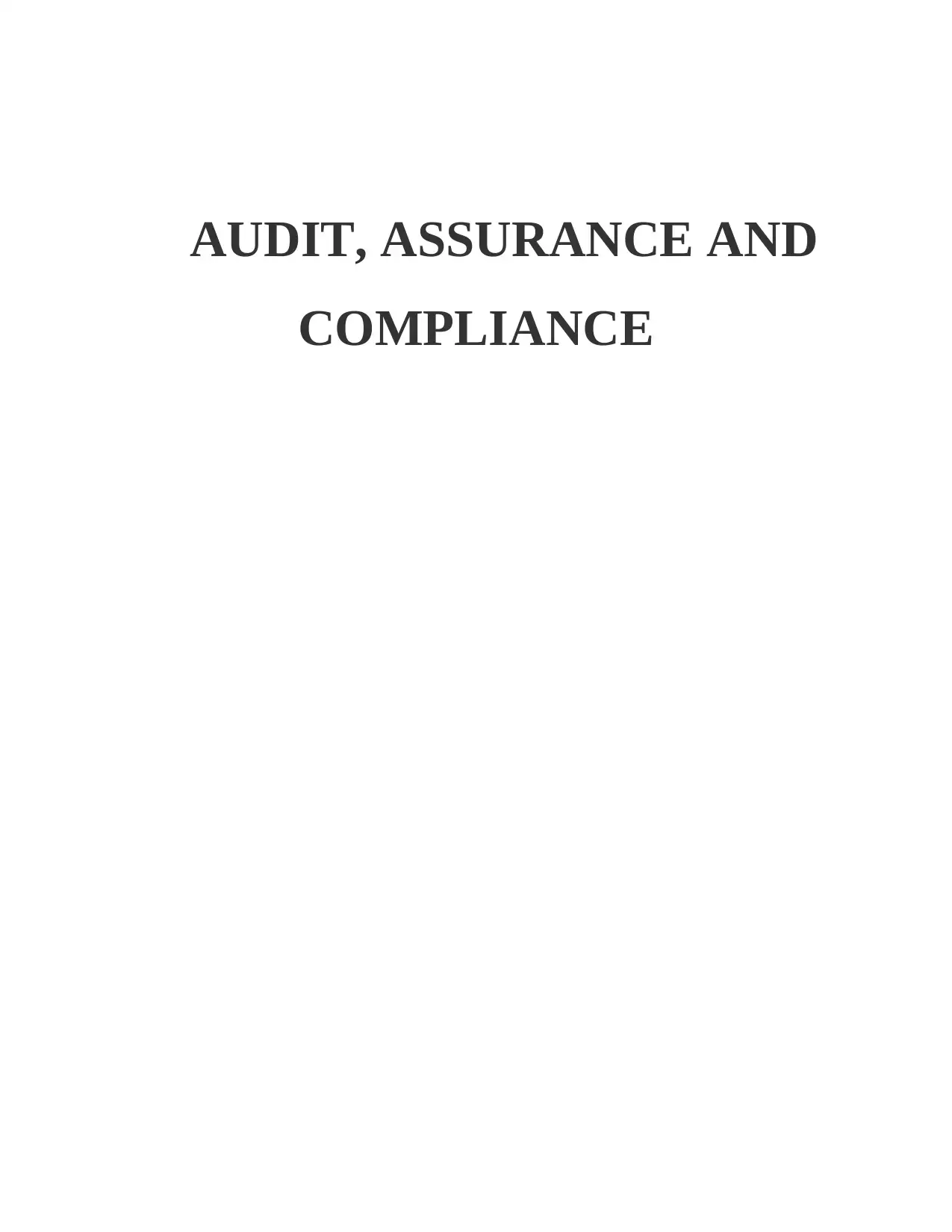
AUDIT, ASSURANCE AND
COMPLIANCE
COMPLIANCE
Secure Best Marks with AI Grader
Need help grading? Try our AI Grader for instant feedback on your assignments.
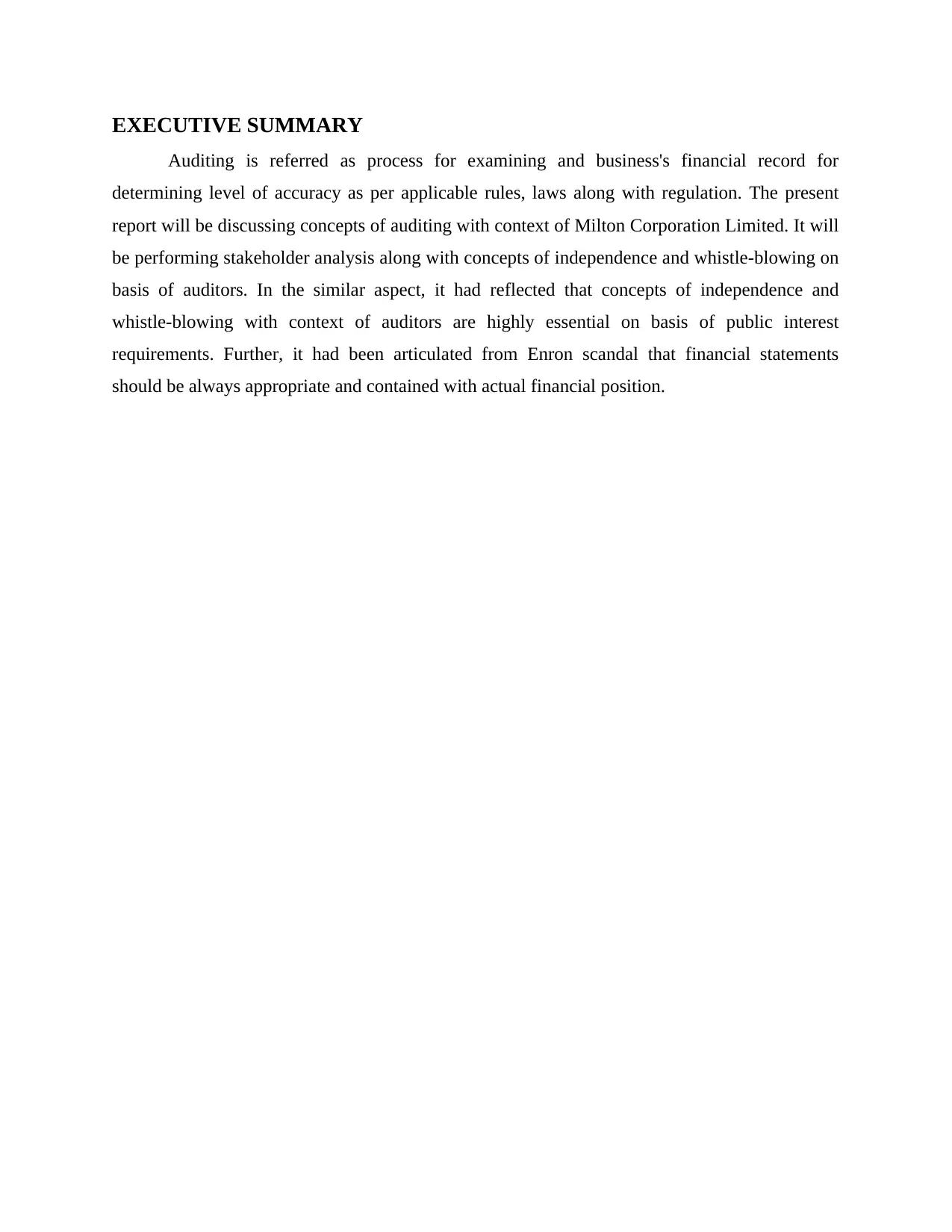
EXECUTIVE SUMMARY
Auditing is referred as process for examining and business's financial record for
determining level of accuracy as per applicable rules, laws along with regulation. The present
report will be discussing concepts of auditing with context of Milton Corporation Limited. It will
be performing stakeholder analysis along with concepts of independence and whistle-blowing on
basis of auditors. In the similar aspect, it had reflected that concepts of independence and
whistle-blowing with context of auditors are highly essential on basis of public interest
requirements. Further, it had been articulated from Enron scandal that financial statements
should be always appropriate and contained with actual financial position.
Auditing is referred as process for examining and business's financial record for
determining level of accuracy as per applicable rules, laws along with regulation. The present
report will be discussing concepts of auditing with context of Milton Corporation Limited. It will
be performing stakeholder analysis along with concepts of independence and whistle-blowing on
basis of auditors. In the similar aspect, it had reflected that concepts of independence and
whistle-blowing with context of auditors are highly essential on basis of public interest
requirements. Further, it had been articulated from Enron scandal that financial statements
should be always appropriate and contained with actual financial position.
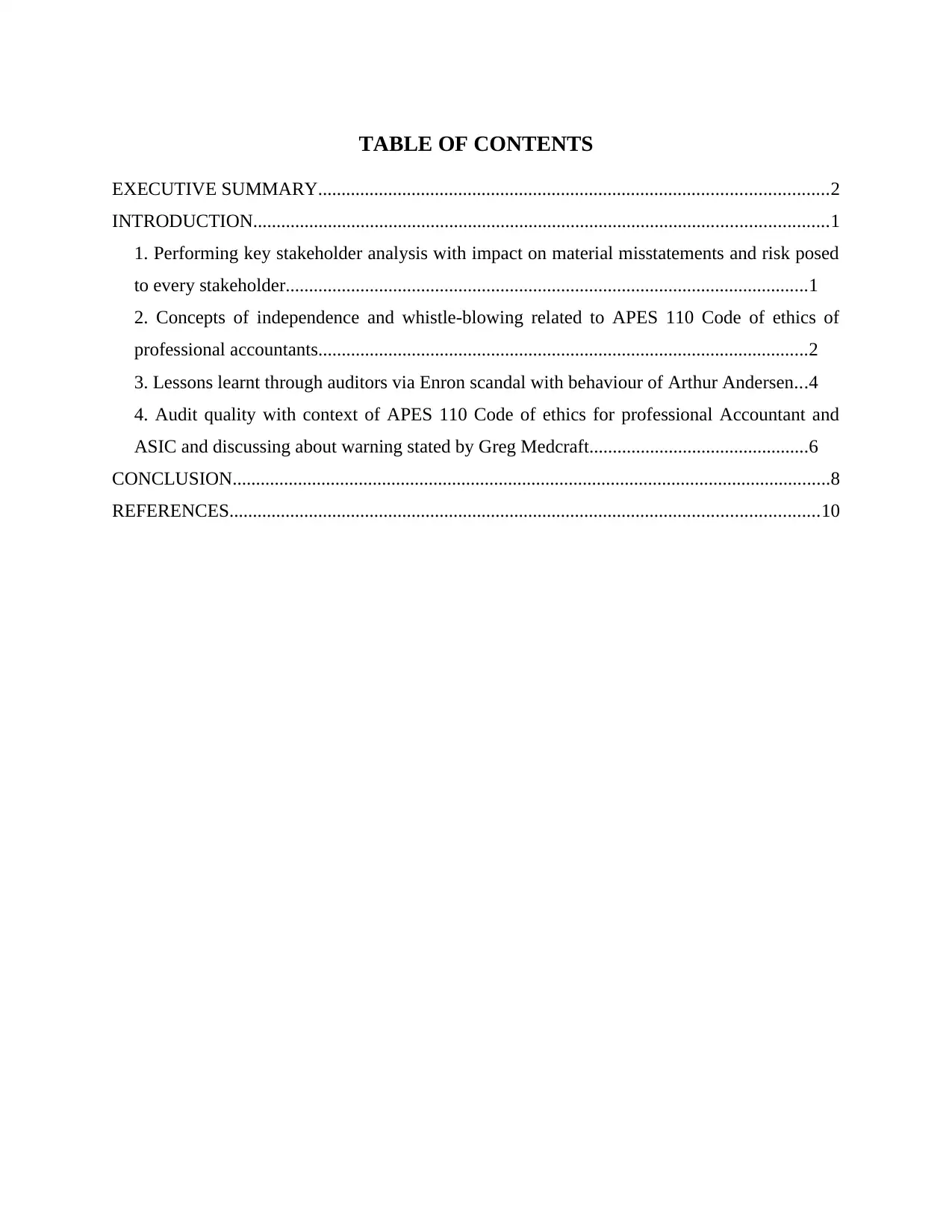
TABLE OF CONTENTS
EXECUTIVE SUMMARY.............................................................................................................2
INTRODUCTION...........................................................................................................................1
1. Performing key stakeholder analysis with impact on material misstatements and risk posed
to every stakeholder................................................................................................................1
2. Concepts of independence and whistle-blowing related to APES 110 Code of ethics of
professional accountants.........................................................................................................2
3. Lessons learnt through auditors via Enron scandal with behaviour of Arthur Andersen...4
4. Audit quality with context of APES 110 Code of ethics for professional Accountant and
ASIC and discussing about warning stated by Greg Medcraft...............................................6
CONCLUSION................................................................................................................................8
REFERENCES..............................................................................................................................10
EXECUTIVE SUMMARY.............................................................................................................2
INTRODUCTION...........................................................................................................................1
1. Performing key stakeholder analysis with impact on material misstatements and risk posed
to every stakeholder................................................................................................................1
2. Concepts of independence and whistle-blowing related to APES 110 Code of ethics of
professional accountants.........................................................................................................2
3. Lessons learnt through auditors via Enron scandal with behaviour of Arthur Andersen...4
4. Audit quality with context of APES 110 Code of ethics for professional Accountant and
ASIC and discussing about warning stated by Greg Medcraft...............................................6
CONCLUSION................................................................................................................................8
REFERENCES..............................................................................................................................10
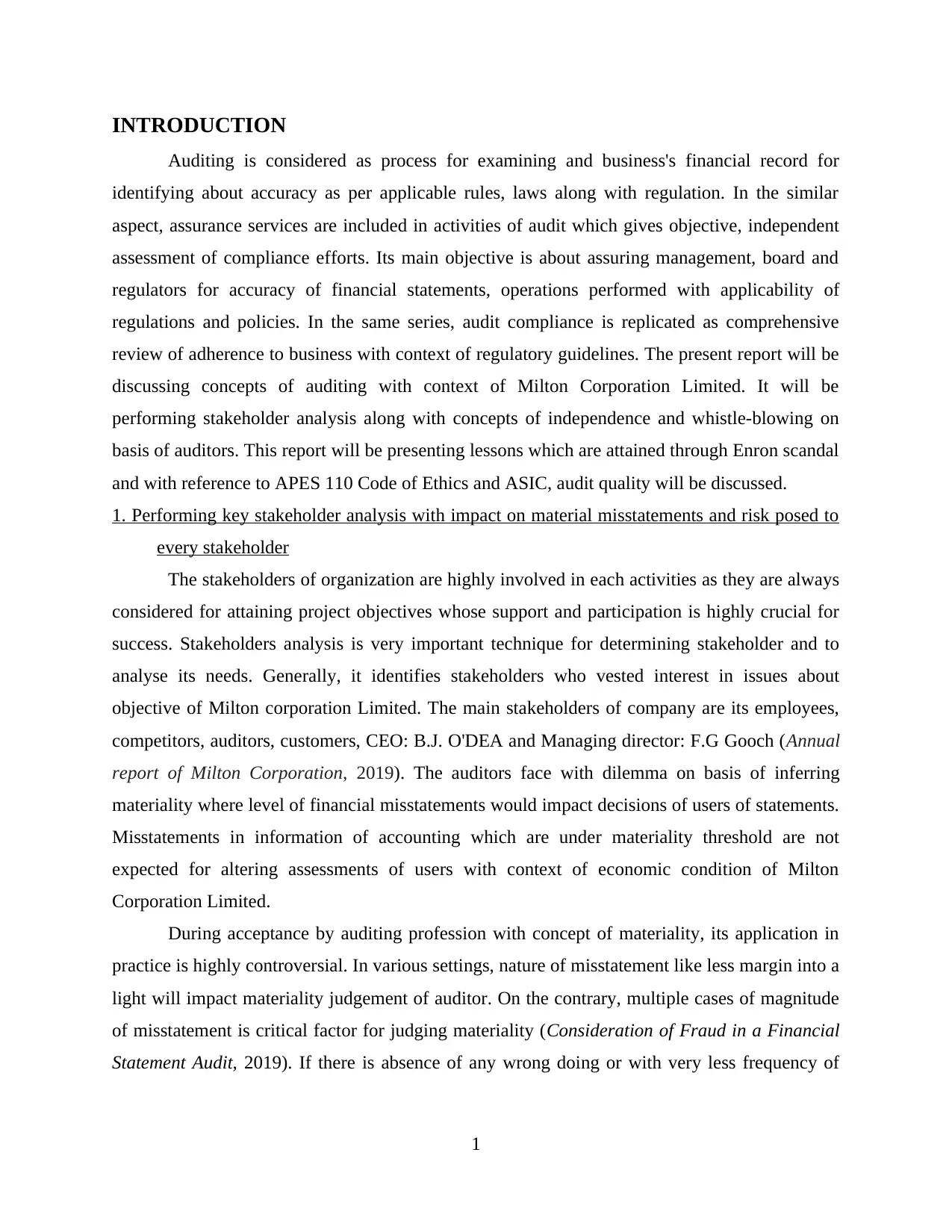
INTRODUCTION
Auditing is considered as process for examining and business's financial record for
identifying about accuracy as per applicable rules, laws along with regulation. In the similar
aspect, assurance services are included in activities of audit which gives objective, independent
assessment of compliance efforts. Its main objective is about assuring management, board and
regulators for accuracy of financial statements, operations performed with applicability of
regulations and policies. In the same series, audit compliance is replicated as comprehensive
review of adherence to business with context of regulatory guidelines. The present report will be
discussing concepts of auditing with context of Milton Corporation Limited. It will be
performing stakeholder analysis along with concepts of independence and whistle-blowing on
basis of auditors. This report will be presenting lessons which are attained through Enron scandal
and with reference to APES 110 Code of Ethics and ASIC, audit quality will be discussed.
1. Performing key stakeholder analysis with impact on material misstatements and risk posed to
every stakeholder
The stakeholders of organization are highly involved in each activities as they are always
considered for attaining project objectives whose support and participation is highly crucial for
success. Stakeholders analysis is very important technique for determining stakeholder and to
analyse its needs. Generally, it identifies stakeholders who vested interest in issues about
objective of Milton corporation Limited. The main stakeholders of company are its employees,
competitors, auditors, customers, CEO: B.J. O'DEA and Managing director: F.G Gooch (Annual
report of Milton Corporation, 2019). The auditors face with dilemma on basis of inferring
materiality where level of financial misstatements would impact decisions of users of statements.
Misstatements in information of accounting which are under materiality threshold are not
expected for altering assessments of users with context of economic condition of Milton
Corporation Limited.
During acceptance by auditing profession with concept of materiality, its application in
practice is highly controversial. In various settings, nature of misstatement like less margin into a
light will impact materiality judgement of auditor. On the contrary, multiple cases of magnitude
of misstatement is critical factor for judging materiality (Consideration of Fraud in a Financial
Statement Audit, 2019). If there is absence of any wrong doing or with very less frequency of
1
Auditing is considered as process for examining and business's financial record for
identifying about accuracy as per applicable rules, laws along with regulation. In the similar
aspect, assurance services are included in activities of audit which gives objective, independent
assessment of compliance efforts. Its main objective is about assuring management, board and
regulators for accuracy of financial statements, operations performed with applicability of
regulations and policies. In the same series, audit compliance is replicated as comprehensive
review of adherence to business with context of regulatory guidelines. The present report will be
discussing concepts of auditing with context of Milton Corporation Limited. It will be
performing stakeholder analysis along with concepts of independence and whistle-blowing on
basis of auditors. This report will be presenting lessons which are attained through Enron scandal
and with reference to APES 110 Code of Ethics and ASIC, audit quality will be discussed.
1. Performing key stakeholder analysis with impact on material misstatements and risk posed to
every stakeholder
The stakeholders of organization are highly involved in each activities as they are always
considered for attaining project objectives whose support and participation is highly crucial for
success. Stakeholders analysis is very important technique for determining stakeholder and to
analyse its needs. Generally, it identifies stakeholders who vested interest in issues about
objective of Milton corporation Limited. The main stakeholders of company are its employees,
competitors, auditors, customers, CEO: B.J. O'DEA and Managing director: F.G Gooch (Annual
report of Milton Corporation, 2019). The auditors face with dilemma on basis of inferring
materiality where level of financial misstatements would impact decisions of users of statements.
Misstatements in information of accounting which are under materiality threshold are not
expected for altering assessments of users with context of economic condition of Milton
Corporation Limited.
During acceptance by auditing profession with concept of materiality, its application in
practice is highly controversial. In various settings, nature of misstatement like less margin into a
light will impact materiality judgement of auditor. On the contrary, multiple cases of magnitude
of misstatement is critical factor for judging materiality (Consideration of Fraud in a Financial
Statement Audit, 2019). If there is absence of any wrong doing or with very less frequency of
1
Secure Best Marks with AI Grader
Need help grading? Try our AI Grader for instant feedback on your assignments.
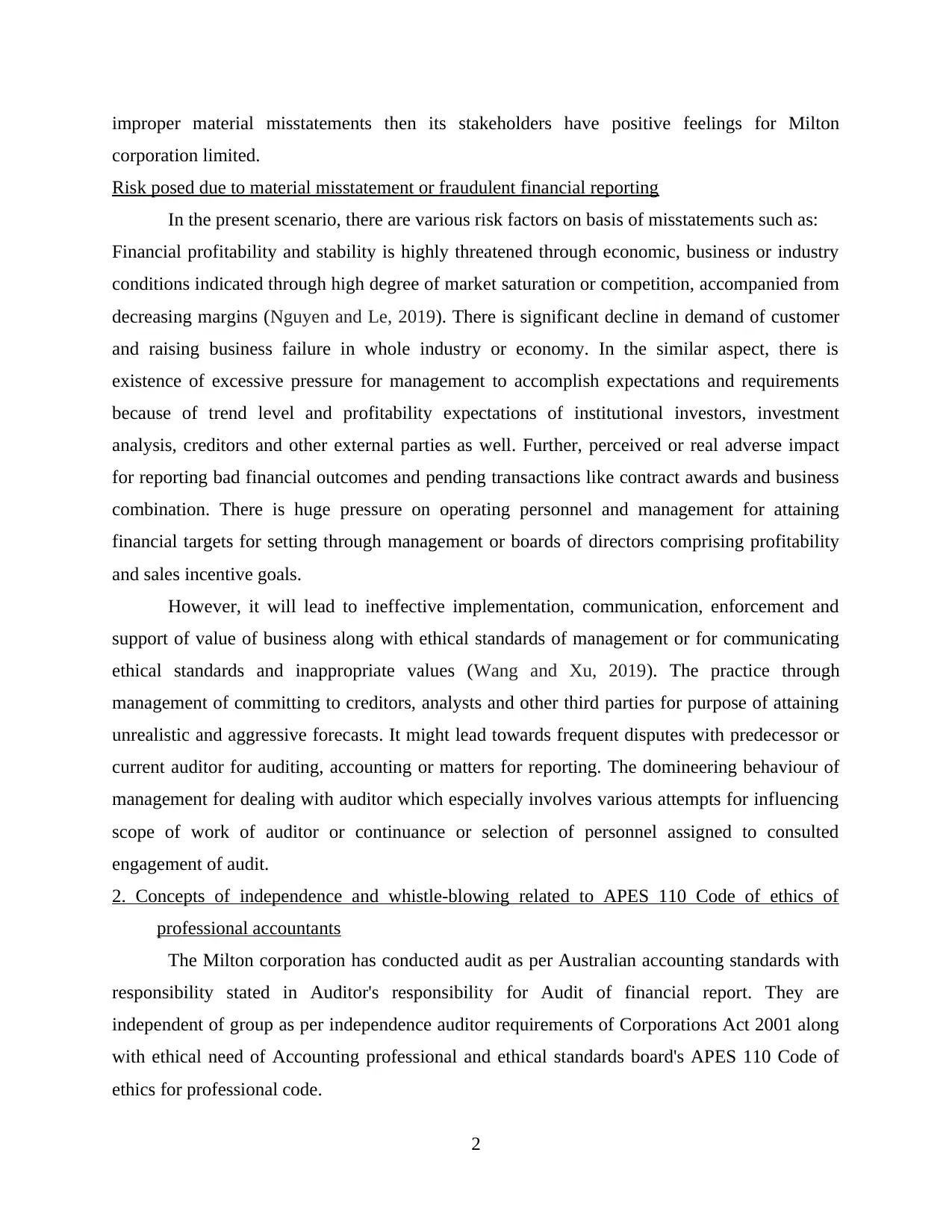
improper material misstatements then its stakeholders have positive feelings for Milton
corporation limited.
Risk posed due to material misstatement or fraudulent financial reporting
In the present scenario, there are various risk factors on basis of misstatements such as:
Financial profitability and stability is highly threatened through economic, business or industry
conditions indicated through high degree of market saturation or competition, accompanied from
decreasing margins (Nguyen and Le, 2019). There is significant decline in demand of customer
and raising business failure in whole industry or economy. In the similar aspect, there is
existence of excessive pressure for management to accomplish expectations and requirements
because of trend level and profitability expectations of institutional investors, investment
analysis, creditors and other external parties as well. Further, perceived or real adverse impact
for reporting bad financial outcomes and pending transactions like contract awards and business
combination. There is huge pressure on operating personnel and management for attaining
financial targets for setting through management or boards of directors comprising profitability
and sales incentive goals.
However, it will lead to ineffective implementation, communication, enforcement and
support of value of business along with ethical standards of management or for communicating
ethical standards and inappropriate values (Wang and Xu, 2019). The practice through
management of committing to creditors, analysts and other third parties for purpose of attaining
unrealistic and aggressive forecasts. It might lead towards frequent disputes with predecessor or
current auditor for auditing, accounting or matters for reporting. The domineering behaviour of
management for dealing with auditor which especially involves various attempts for influencing
scope of work of auditor or continuance or selection of personnel assigned to consulted
engagement of audit.
2. Concepts of independence and whistle-blowing related to APES 110 Code of ethics of
professional accountants
The Milton corporation has conducted audit as per Australian accounting standards with
responsibility stated in Auditor's responsibility for Audit of financial report. They are
independent of group as per independence auditor requirements of Corporations Act 2001 along
with ethical need of Accounting professional and ethical standards board's APES 110 Code of
ethics for professional code.
2
corporation limited.
Risk posed due to material misstatement or fraudulent financial reporting
In the present scenario, there are various risk factors on basis of misstatements such as:
Financial profitability and stability is highly threatened through economic, business or industry
conditions indicated through high degree of market saturation or competition, accompanied from
decreasing margins (Nguyen and Le, 2019). There is significant decline in demand of customer
and raising business failure in whole industry or economy. In the similar aspect, there is
existence of excessive pressure for management to accomplish expectations and requirements
because of trend level and profitability expectations of institutional investors, investment
analysis, creditors and other external parties as well. Further, perceived or real adverse impact
for reporting bad financial outcomes and pending transactions like contract awards and business
combination. There is huge pressure on operating personnel and management for attaining
financial targets for setting through management or boards of directors comprising profitability
and sales incentive goals.
However, it will lead to ineffective implementation, communication, enforcement and
support of value of business along with ethical standards of management or for communicating
ethical standards and inappropriate values (Wang and Xu, 2019). The practice through
management of committing to creditors, analysts and other third parties for purpose of attaining
unrealistic and aggressive forecasts. It might lead towards frequent disputes with predecessor or
current auditor for auditing, accounting or matters for reporting. The domineering behaviour of
management for dealing with auditor which especially involves various attempts for influencing
scope of work of auditor or continuance or selection of personnel assigned to consulted
engagement of audit.
2. Concepts of independence and whistle-blowing related to APES 110 Code of ethics of
professional accountants
The Milton corporation has conducted audit as per Australian accounting standards with
responsibility stated in Auditor's responsibility for Audit of financial report. They are
independent of group as per independence auditor requirements of Corporations Act 2001 along
with ethical need of Accounting professional and ethical standards board's APES 110 Code of
ethics for professional code.
2
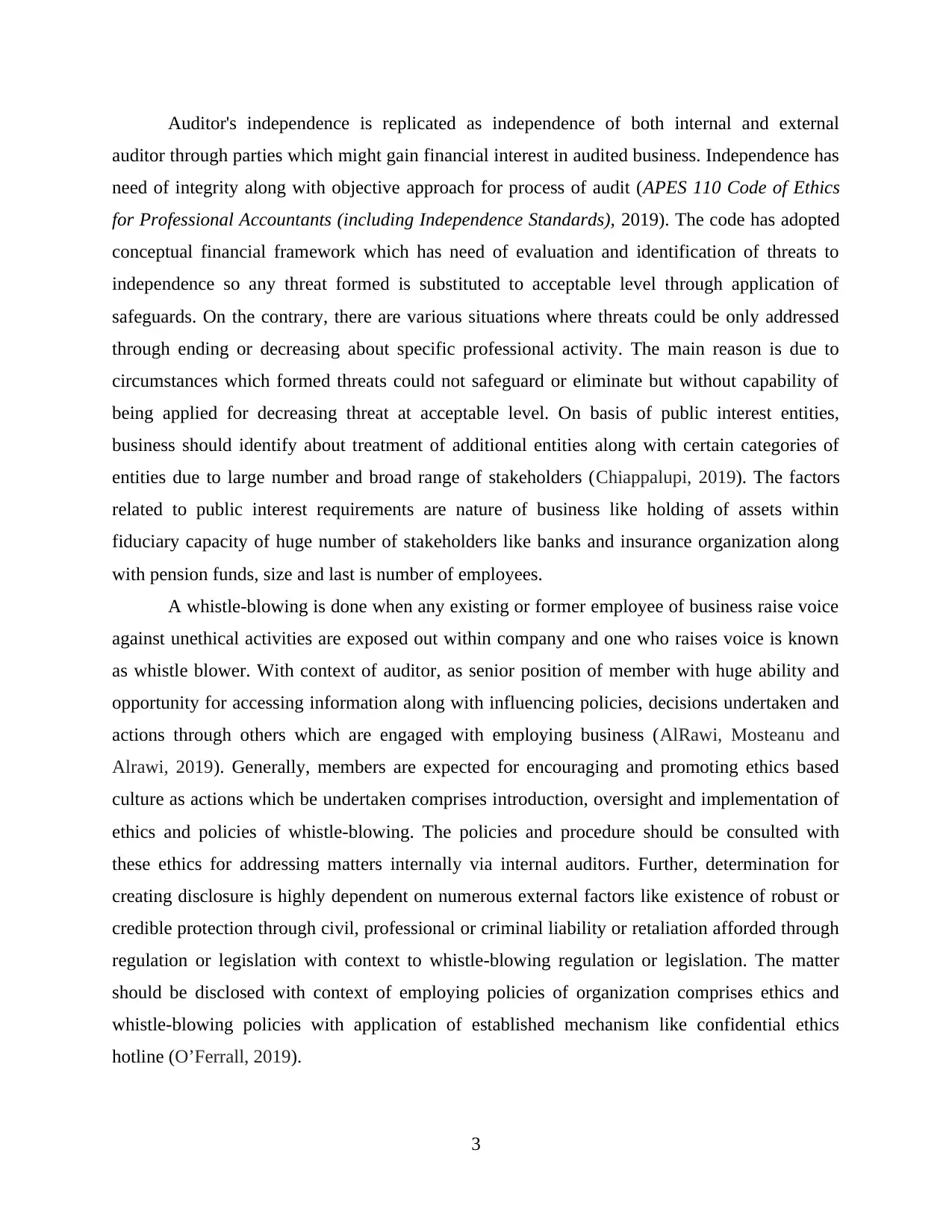
Auditor's independence is replicated as independence of both internal and external
auditor through parties which might gain financial interest in audited business. Independence has
need of integrity along with objective approach for process of audit (APES 110 Code of Ethics
for Professional Accountants (including Independence Standards), 2019). The code has adopted
conceptual financial framework which has need of evaluation and identification of threats to
independence so any threat formed is substituted to acceptable level through application of
safeguards. On the contrary, there are various situations where threats could be only addressed
through ending or decreasing about specific professional activity. The main reason is due to
circumstances which formed threats could not safeguard or eliminate but without capability of
being applied for decreasing threat at acceptable level. On basis of public interest entities,
business should identify about treatment of additional entities along with certain categories of
entities due to large number and broad range of stakeholders (Chiappalupi, 2019). The factors
related to public interest requirements are nature of business like holding of assets within
fiduciary capacity of huge number of stakeholders like banks and insurance organization along
with pension funds, size and last is number of employees.
A whistle-blowing is done when any existing or former employee of business raise voice
against unethical activities are exposed out within company and one who raises voice is known
as whistle blower. With context of auditor, as senior position of member with huge ability and
opportunity for accessing information along with influencing policies, decisions undertaken and
actions through others which are engaged with employing business (AlRawi, Mosteanu and
Alrawi, 2019). Generally, members are expected for encouraging and promoting ethics based
culture as actions which be undertaken comprises introduction, oversight and implementation of
ethics and policies of whistle-blowing. The policies and procedure should be consulted with
these ethics for addressing matters internally via internal auditors. Further, determination for
creating disclosure is highly dependent on numerous external factors like existence of robust or
credible protection through civil, professional or criminal liability or retaliation afforded through
regulation or legislation with context to whistle-blowing regulation or legislation. The matter
should be disclosed with context of employing policies of organization comprises ethics and
whistle-blowing policies with application of established mechanism like confidential ethics
hotline (O’Ferrall, 2019).
3
auditor through parties which might gain financial interest in audited business. Independence has
need of integrity along with objective approach for process of audit (APES 110 Code of Ethics
for Professional Accountants (including Independence Standards), 2019). The code has adopted
conceptual financial framework which has need of evaluation and identification of threats to
independence so any threat formed is substituted to acceptable level through application of
safeguards. On the contrary, there are various situations where threats could be only addressed
through ending or decreasing about specific professional activity. The main reason is due to
circumstances which formed threats could not safeguard or eliminate but without capability of
being applied for decreasing threat at acceptable level. On basis of public interest entities,
business should identify about treatment of additional entities along with certain categories of
entities due to large number and broad range of stakeholders (Chiappalupi, 2019). The factors
related to public interest requirements are nature of business like holding of assets within
fiduciary capacity of huge number of stakeholders like banks and insurance organization along
with pension funds, size and last is number of employees.
A whistle-blowing is done when any existing or former employee of business raise voice
against unethical activities are exposed out within company and one who raises voice is known
as whistle blower. With context of auditor, as senior position of member with huge ability and
opportunity for accessing information along with influencing policies, decisions undertaken and
actions through others which are engaged with employing business (AlRawi, Mosteanu and
Alrawi, 2019). Generally, members are expected for encouraging and promoting ethics based
culture as actions which be undertaken comprises introduction, oversight and implementation of
ethics and policies of whistle-blowing. The policies and procedure should be consulted with
these ethics for addressing matters internally via internal auditors. Further, determination for
creating disclosure is highly dependent on numerous external factors like existence of robust or
credible protection through civil, professional or criminal liability or retaliation afforded through
regulation or legislation with context to whistle-blowing regulation or legislation. The matter
should be disclosed with context of employing policies of organization comprises ethics and
whistle-blowing policies with application of established mechanism like confidential ethics
hotline (O’Ferrall, 2019).
3
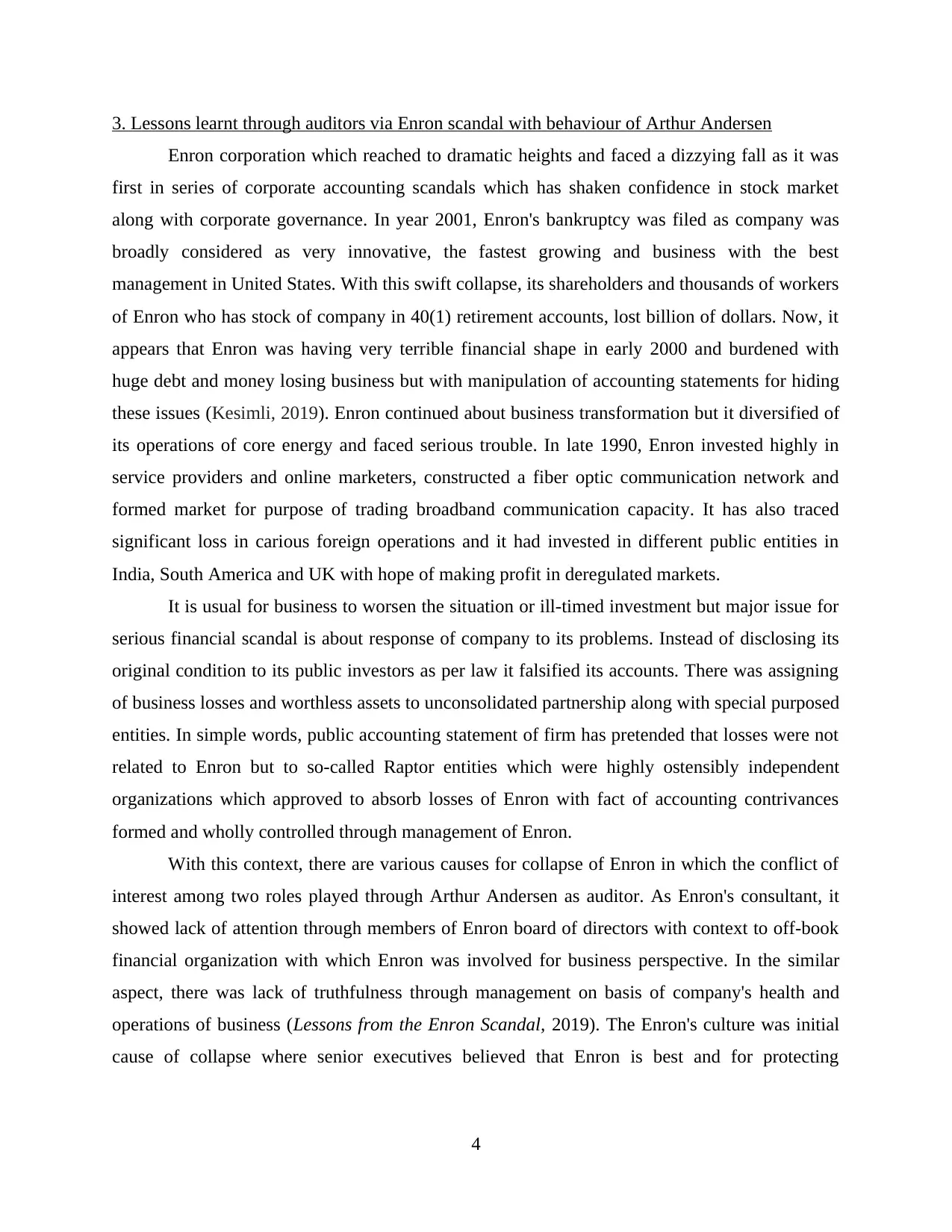
3. Lessons learnt through auditors via Enron scandal with behaviour of Arthur Andersen
Enron corporation which reached to dramatic heights and faced a dizzying fall as it was
first in series of corporate accounting scandals which has shaken confidence in stock market
along with corporate governance. In year 2001, Enron's bankruptcy was filed as company was
broadly considered as very innovative, the fastest growing and business with the best
management in United States. With this swift collapse, its shareholders and thousands of workers
of Enron who has stock of company in 40(1) retirement accounts, lost billion of dollars. Now, it
appears that Enron was having very terrible financial shape in early 2000 and burdened with
huge debt and money losing business but with manipulation of accounting statements for hiding
these issues (Kesimli, 2019). Enron continued about business transformation but it diversified of
its operations of core energy and faced serious trouble. In late 1990, Enron invested highly in
service providers and online marketers, constructed a fiber optic communication network and
formed market for purpose of trading broadband communication capacity. It has also traced
significant loss in carious foreign operations and it had invested in different public entities in
India, South America and UK with hope of making profit in deregulated markets.
It is usual for business to worsen the situation or ill-timed investment but major issue for
serious financial scandal is about response of company to its problems. Instead of disclosing its
original condition to its public investors as per law it falsified its accounts. There was assigning
of business losses and worthless assets to unconsolidated partnership along with special purposed
entities. In simple words, public accounting statement of firm has pretended that losses were not
related to Enron but to so-called Raptor entities which were highly ostensibly independent
organizations which approved to absorb losses of Enron with fact of accounting contrivances
formed and wholly controlled through management of Enron.
With this context, there are various causes for collapse of Enron in which the conflict of
interest among two roles played through Arthur Andersen as auditor. As Enron's consultant, it
showed lack of attention through members of Enron board of directors with context to off-book
financial organization with which Enron was involved for business perspective. In the similar
aspect, there was lack of truthfulness through management on basis of company's health and
operations of business (Lessons from the Enron Scandal, 2019). The Enron's culture was initial
cause of collapse where senior executives believed that Enron is best and for protecting
4
Enron corporation which reached to dramatic heights and faced a dizzying fall as it was
first in series of corporate accounting scandals which has shaken confidence in stock market
along with corporate governance. In year 2001, Enron's bankruptcy was filed as company was
broadly considered as very innovative, the fastest growing and business with the best
management in United States. With this swift collapse, its shareholders and thousands of workers
of Enron who has stock of company in 40(1) retirement accounts, lost billion of dollars. Now, it
appears that Enron was having very terrible financial shape in early 2000 and burdened with
huge debt and money losing business but with manipulation of accounting statements for hiding
these issues (Kesimli, 2019). Enron continued about business transformation but it diversified of
its operations of core energy and faced serious trouble. In late 1990, Enron invested highly in
service providers and online marketers, constructed a fiber optic communication network and
formed market for purpose of trading broadband communication capacity. It has also traced
significant loss in carious foreign operations and it had invested in different public entities in
India, South America and UK with hope of making profit in deregulated markets.
It is usual for business to worsen the situation or ill-timed investment but major issue for
serious financial scandal is about response of company to its problems. Instead of disclosing its
original condition to its public investors as per law it falsified its accounts. There was assigning
of business losses and worthless assets to unconsolidated partnership along with special purposed
entities. In simple words, public accounting statement of firm has pretended that losses were not
related to Enron but to so-called Raptor entities which were highly ostensibly independent
organizations which approved to absorb losses of Enron with fact of accounting contrivances
formed and wholly controlled through management of Enron.
With this context, there are various causes for collapse of Enron in which the conflict of
interest among two roles played through Arthur Andersen as auditor. As Enron's consultant, it
showed lack of attention through members of Enron board of directors with context to off-book
financial organization with which Enron was involved for business perspective. In the similar
aspect, there was lack of truthfulness through management on basis of company's health and
operations of business (Lessons from the Enron Scandal, 2019). The Enron's culture was initial
cause of collapse where senior executives believed that Enron is best and for protecting
4
Paraphrase This Document
Need a fresh take? Get an instant paraphrase of this document with our AI Paraphraser
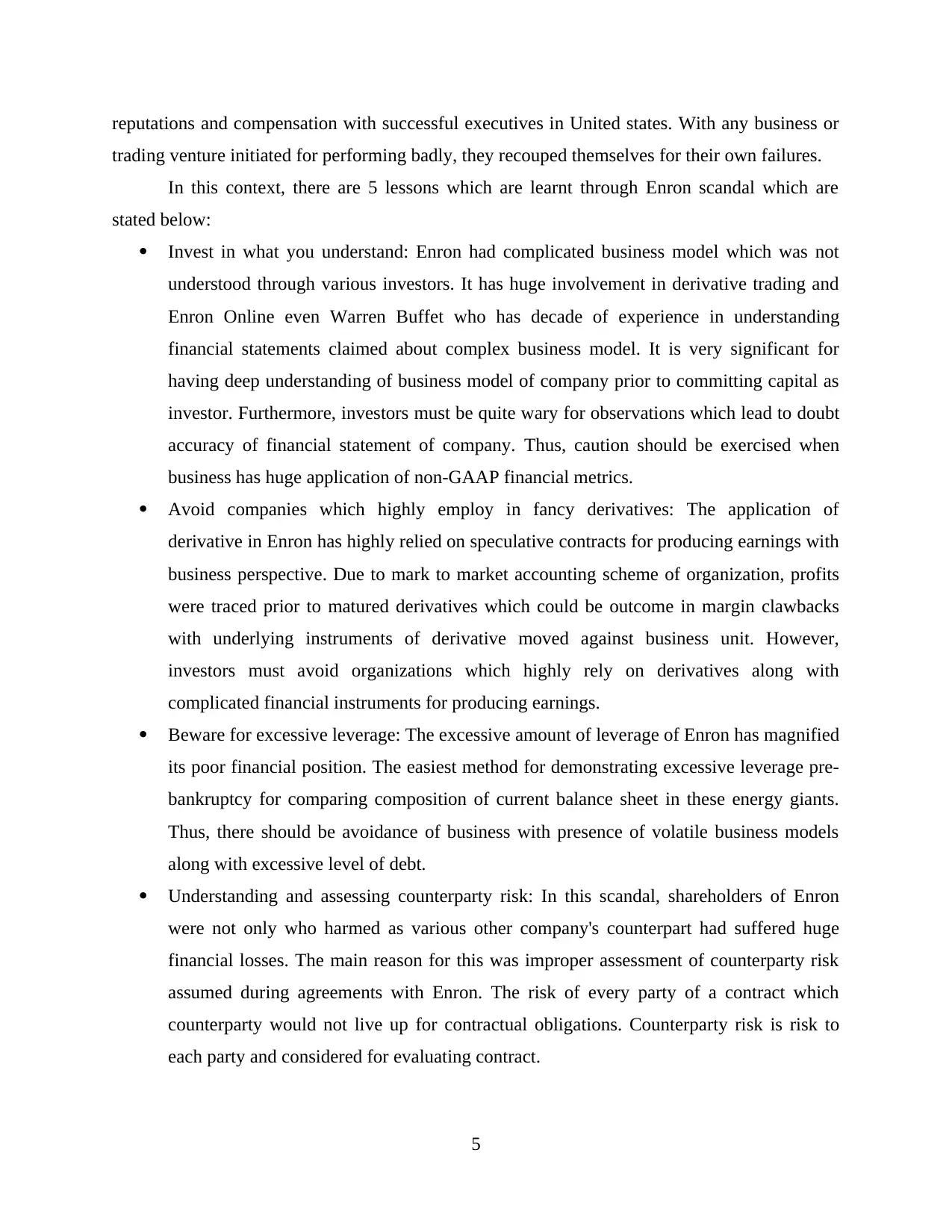
reputations and compensation with successful executives in United states. With any business or
trading venture initiated for performing badly, they recouped themselves for their own failures.
In this context, there are 5 lessons which are learnt through Enron scandal which are
stated below:
Invest in what you understand: Enron had complicated business model which was not
understood through various investors. It has huge involvement in derivative trading and
Enron Online even Warren Buffet who has decade of experience in understanding
financial statements claimed about complex business model. It is very significant for
having deep understanding of business model of company prior to committing capital as
investor. Furthermore, investors must be quite wary for observations which lead to doubt
accuracy of financial statement of company. Thus, caution should be exercised when
business has huge application of non-GAAP financial metrics.
Avoid companies which highly employ in fancy derivatives: The application of
derivative in Enron has highly relied on speculative contracts for producing earnings with
business perspective. Due to mark to market accounting scheme of organization, profits
were traced prior to matured derivatives which could be outcome in margin clawbacks
with underlying instruments of derivative moved against business unit. However,
investors must avoid organizations which highly rely on derivatives along with
complicated financial instruments for producing earnings.
Beware for excessive leverage: The excessive amount of leverage of Enron has magnified
its poor financial position. The easiest method for demonstrating excessive leverage pre-
bankruptcy for comparing composition of current balance sheet in these energy giants.
Thus, there should be avoidance of business with presence of volatile business models
along with excessive level of debt.
Understanding and assessing counterparty risk: In this scandal, shareholders of Enron
were not only who harmed as various other company's counterpart had suffered huge
financial losses. The main reason for this was improper assessment of counterparty risk
assumed during agreements with Enron. The risk of every party of a contract which
counterparty would not live up for contractual obligations. Counterparty risk is risk to
each party and considered for evaluating contract.
5
trading venture initiated for performing badly, they recouped themselves for their own failures.
In this context, there are 5 lessons which are learnt through Enron scandal which are
stated below:
Invest in what you understand: Enron had complicated business model which was not
understood through various investors. It has huge involvement in derivative trading and
Enron Online even Warren Buffet who has decade of experience in understanding
financial statements claimed about complex business model. It is very significant for
having deep understanding of business model of company prior to committing capital as
investor. Furthermore, investors must be quite wary for observations which lead to doubt
accuracy of financial statement of company. Thus, caution should be exercised when
business has huge application of non-GAAP financial metrics.
Avoid companies which highly employ in fancy derivatives: The application of
derivative in Enron has highly relied on speculative contracts for producing earnings with
business perspective. Due to mark to market accounting scheme of organization, profits
were traced prior to matured derivatives which could be outcome in margin clawbacks
with underlying instruments of derivative moved against business unit. However,
investors must avoid organizations which highly rely on derivatives along with
complicated financial instruments for producing earnings.
Beware for excessive leverage: The excessive amount of leverage of Enron has magnified
its poor financial position. The easiest method for demonstrating excessive leverage pre-
bankruptcy for comparing composition of current balance sheet in these energy giants.
Thus, there should be avoidance of business with presence of volatile business models
along with excessive level of debt.
Understanding and assessing counterparty risk: In this scandal, shareholders of Enron
were not only who harmed as various other company's counterpart had suffered huge
financial losses. The main reason for this was improper assessment of counterparty risk
assumed during agreements with Enron. The risk of every party of a contract which
counterparty would not live up for contractual obligations. Counterparty risk is risk to
each party and considered for evaluating contract.
5
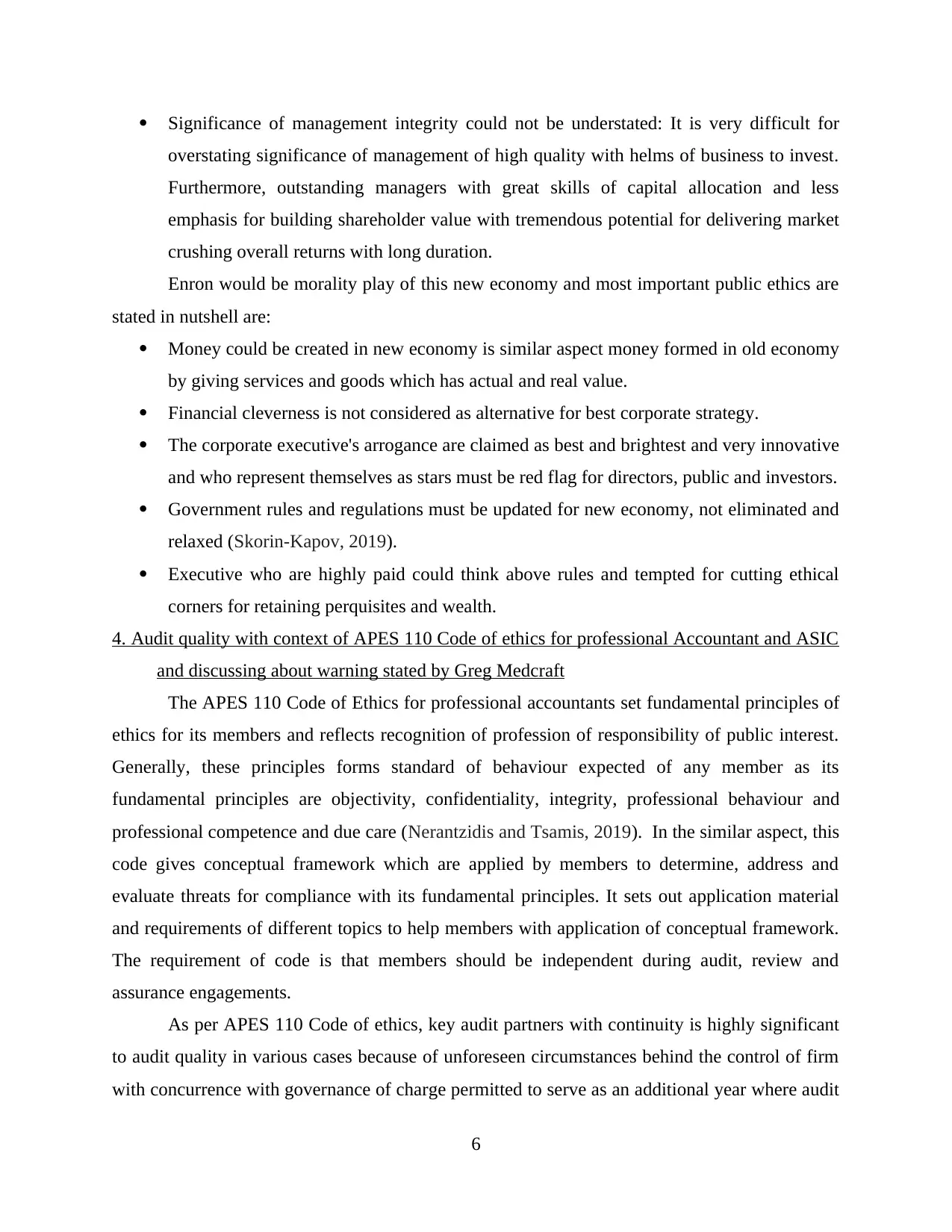
Significance of management integrity could not be understated: It is very difficult for
overstating significance of management of high quality with helms of business to invest.
Furthermore, outstanding managers with great skills of capital allocation and less
emphasis for building shareholder value with tremendous potential for delivering market
crushing overall returns with long duration.
Enron would be morality play of this new economy and most important public ethics are
stated in nutshell are:
Money could be created in new economy is similar aspect money formed in old economy
by giving services and goods which has actual and real value.
Financial cleverness is not considered as alternative for best corporate strategy.
The corporate executive's arrogance are claimed as best and brightest and very innovative
and who represent themselves as stars must be red flag for directors, public and investors.
Government rules and regulations must be updated for new economy, not eliminated and
relaxed (Skorin-Kapov, 2019).
Executive who are highly paid could think above rules and tempted for cutting ethical
corners for retaining perquisites and wealth.
4. Audit quality with context of APES 110 Code of ethics for professional Accountant and ASIC
and discussing about warning stated by Greg Medcraft
The APES 110 Code of Ethics for professional accountants set fundamental principles of
ethics for its members and reflects recognition of profession of responsibility of public interest.
Generally, these principles forms standard of behaviour expected of any member as its
fundamental principles are objectivity, confidentiality, integrity, professional behaviour and
professional competence and due care (Nerantzidis and Tsamis, 2019). In the similar aspect, this
code gives conceptual framework which are applied by members to determine, address and
evaluate threats for compliance with its fundamental principles. It sets out application material
and requirements of different topics to help members with application of conceptual framework.
The requirement of code is that members should be independent during audit, review and
assurance engagements.
As per APES 110 Code of ethics, key audit partners with continuity is highly significant
to audit quality in various cases because of unforeseen circumstances behind the control of firm
with concurrence with governance of charge permitted to serve as an additional year where audit
6
overstating significance of management of high quality with helms of business to invest.
Furthermore, outstanding managers with great skills of capital allocation and less
emphasis for building shareholder value with tremendous potential for delivering market
crushing overall returns with long duration.
Enron would be morality play of this new economy and most important public ethics are
stated in nutshell are:
Money could be created in new economy is similar aspect money formed in old economy
by giving services and goods which has actual and real value.
Financial cleverness is not considered as alternative for best corporate strategy.
The corporate executive's arrogance are claimed as best and brightest and very innovative
and who represent themselves as stars must be red flag for directors, public and investors.
Government rules and regulations must be updated for new economy, not eliminated and
relaxed (Skorin-Kapov, 2019).
Executive who are highly paid could think above rules and tempted for cutting ethical
corners for retaining perquisites and wealth.
4. Audit quality with context of APES 110 Code of ethics for professional Accountant and ASIC
and discussing about warning stated by Greg Medcraft
The APES 110 Code of Ethics for professional accountants set fundamental principles of
ethics for its members and reflects recognition of profession of responsibility of public interest.
Generally, these principles forms standard of behaviour expected of any member as its
fundamental principles are objectivity, confidentiality, integrity, professional behaviour and
professional competence and due care (Nerantzidis and Tsamis, 2019). In the similar aspect, this
code gives conceptual framework which are applied by members to determine, address and
evaluate threats for compliance with its fundamental principles. It sets out application material
and requirements of different topics to help members with application of conceptual framework.
The requirement of code is that members should be independent during audit, review and
assurance engagements.
As per APES 110 Code of ethics, key audit partners with continuity is highly significant
to audit quality in various cases because of unforeseen circumstances behind the control of firm
with concurrence with governance of charge permitted to serve as an additional year where audit
6
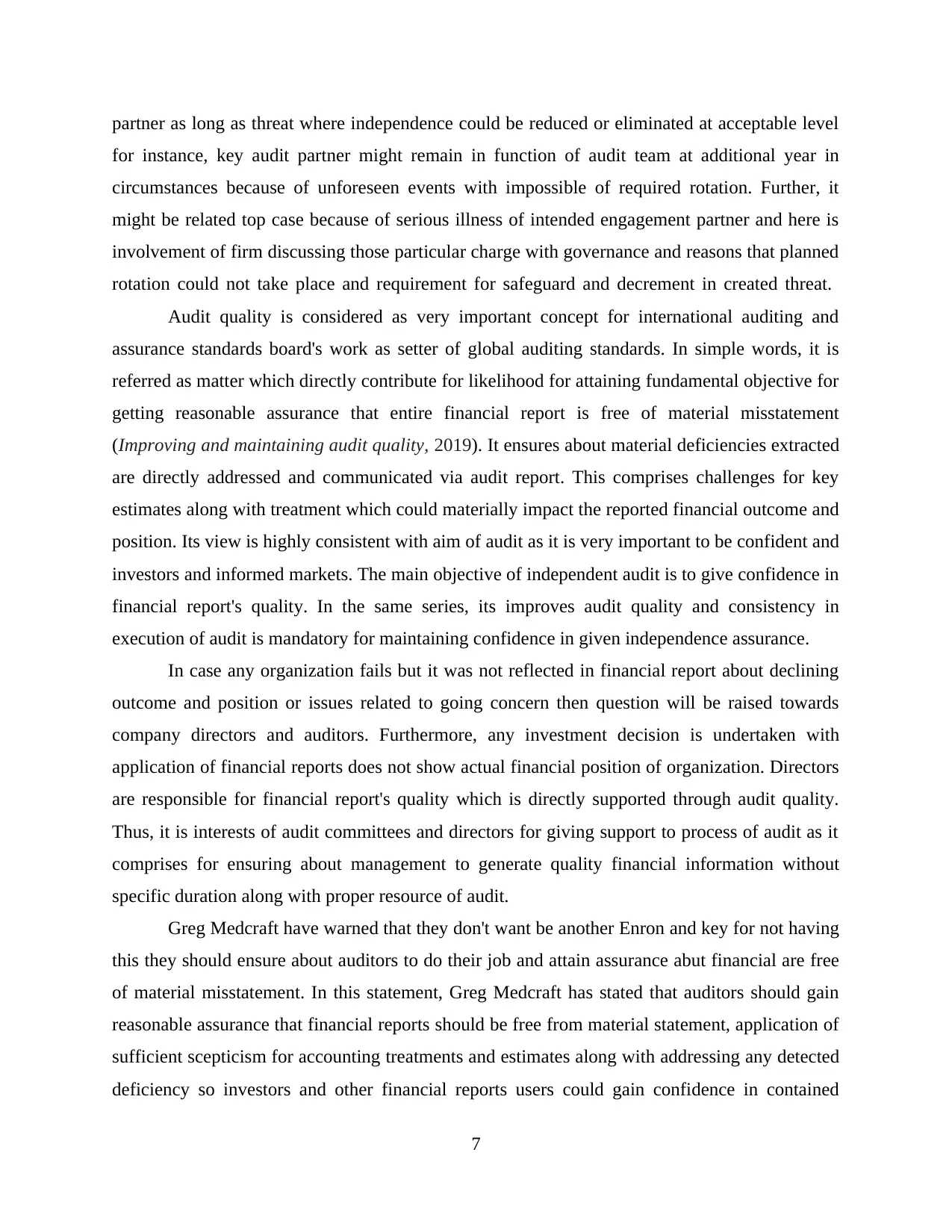
partner as long as threat where independence could be reduced or eliminated at acceptable level
for instance, key audit partner might remain in function of audit team at additional year in
circumstances because of unforeseen events with impossible of required rotation. Further, it
might be related top case because of serious illness of intended engagement partner and here is
involvement of firm discussing those particular charge with governance and reasons that planned
rotation could not take place and requirement for safeguard and decrement in created threat.
Audit quality is considered as very important concept for international auditing and
assurance standards board's work as setter of global auditing standards. In simple words, it is
referred as matter which directly contribute for likelihood for attaining fundamental objective for
getting reasonable assurance that entire financial report is free of material misstatement
(Improving and maintaining audit quality, 2019). It ensures about material deficiencies extracted
are directly addressed and communicated via audit report. This comprises challenges for key
estimates along with treatment which could materially impact the reported financial outcome and
position. Its view is highly consistent with aim of audit as it is very important to be confident and
investors and informed markets. The main objective of independent audit is to give confidence in
financial report's quality. In the same series, its improves audit quality and consistency in
execution of audit is mandatory for maintaining confidence in given independence assurance.
In case any organization fails but it was not reflected in financial report about declining
outcome and position or issues related to going concern then question will be raised towards
company directors and auditors. Furthermore, any investment decision is undertaken with
application of financial reports does not show actual financial position of organization. Directors
are responsible for financial report's quality which is directly supported through audit quality.
Thus, it is interests of audit committees and directors for giving support to process of audit as it
comprises for ensuring about management to generate quality financial information without
specific duration along with proper resource of audit.
Greg Medcraft have warned that they don't want be another Enron and key for not having
this they should ensure about auditors to do their job and attain assurance abut financial are free
of material misstatement. In this statement, Greg Medcraft has stated that auditors should gain
reasonable assurance that financial reports should be free from material statement, application of
sufficient scepticism for accounting treatments and estimates along with addressing any detected
deficiency so investors and other financial reports users could gain confidence in contained
7
for instance, key audit partner might remain in function of audit team at additional year in
circumstances because of unforeseen events with impossible of required rotation. Further, it
might be related top case because of serious illness of intended engagement partner and here is
involvement of firm discussing those particular charge with governance and reasons that planned
rotation could not take place and requirement for safeguard and decrement in created threat.
Audit quality is considered as very important concept for international auditing and
assurance standards board's work as setter of global auditing standards. In simple words, it is
referred as matter which directly contribute for likelihood for attaining fundamental objective for
getting reasonable assurance that entire financial report is free of material misstatement
(Improving and maintaining audit quality, 2019). It ensures about material deficiencies extracted
are directly addressed and communicated via audit report. This comprises challenges for key
estimates along with treatment which could materially impact the reported financial outcome and
position. Its view is highly consistent with aim of audit as it is very important to be confident and
investors and informed markets. The main objective of independent audit is to give confidence in
financial report's quality. In the same series, its improves audit quality and consistency in
execution of audit is mandatory for maintaining confidence in given independence assurance.
In case any organization fails but it was not reflected in financial report about declining
outcome and position or issues related to going concern then question will be raised towards
company directors and auditors. Furthermore, any investment decision is undertaken with
application of financial reports does not show actual financial position of organization. Directors
are responsible for financial report's quality which is directly supported through audit quality.
Thus, it is interests of audit committees and directors for giving support to process of audit as it
comprises for ensuring about management to generate quality financial information without
specific duration along with proper resource of audit.
Greg Medcraft have warned that they don't want be another Enron and key for not having
this they should ensure about auditors to do their job and attain assurance abut financial are free
of material misstatement. In this statement, Greg Medcraft has stated that auditors should gain
reasonable assurance that financial reports should be free from material statement, application of
sufficient scepticism for accounting treatments and estimates along with addressing any detected
deficiency so investors and other financial reports users could gain confidence in contained
7
Secure Best Marks with AI Grader
Need help grading? Try our AI Grader for instant feedback on your assignments.
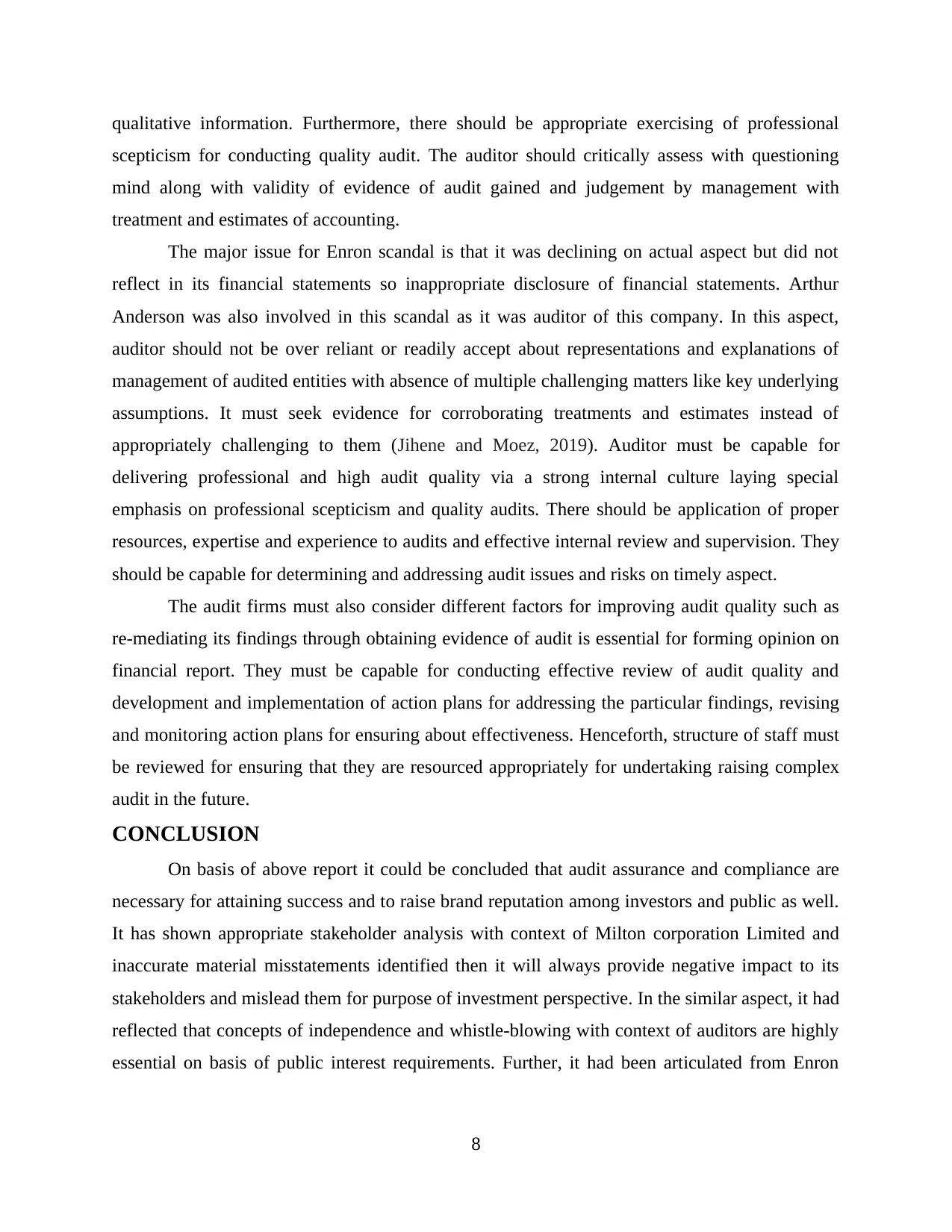
qualitative information. Furthermore, there should be appropriate exercising of professional
scepticism for conducting quality audit. The auditor should critically assess with questioning
mind along with validity of evidence of audit gained and judgement by management with
treatment and estimates of accounting.
The major issue for Enron scandal is that it was declining on actual aspect but did not
reflect in its financial statements so inappropriate disclosure of financial statements. Arthur
Anderson was also involved in this scandal as it was auditor of this company. In this aspect,
auditor should not be over reliant or readily accept about representations and explanations of
management of audited entities with absence of multiple challenging matters like key underlying
assumptions. It must seek evidence for corroborating treatments and estimates instead of
appropriately challenging to them (Jihene and Moez, 2019). Auditor must be capable for
delivering professional and high audit quality via a strong internal culture laying special
emphasis on professional scepticism and quality audits. There should be application of proper
resources, expertise and experience to audits and effective internal review and supervision. They
should be capable for determining and addressing audit issues and risks on timely aspect.
The audit firms must also consider different factors for improving audit quality such as
re-mediating its findings through obtaining evidence of audit is essential for forming opinion on
financial report. They must be capable for conducting effective review of audit quality and
development and implementation of action plans for addressing the particular findings, revising
and monitoring action plans for ensuring about effectiveness. Henceforth, structure of staff must
be reviewed for ensuring that they are resourced appropriately for undertaking raising complex
audit in the future.
CONCLUSION
On basis of above report it could be concluded that audit assurance and compliance are
necessary for attaining success and to raise brand reputation among investors and public as well.
It has shown appropriate stakeholder analysis with context of Milton corporation Limited and
inaccurate material misstatements identified then it will always provide negative impact to its
stakeholders and mislead them for purpose of investment perspective. In the similar aspect, it had
reflected that concepts of independence and whistle-blowing with context of auditors are highly
essential on basis of public interest requirements. Further, it had been articulated from Enron
8
scepticism for conducting quality audit. The auditor should critically assess with questioning
mind along with validity of evidence of audit gained and judgement by management with
treatment and estimates of accounting.
The major issue for Enron scandal is that it was declining on actual aspect but did not
reflect in its financial statements so inappropriate disclosure of financial statements. Arthur
Anderson was also involved in this scandal as it was auditor of this company. In this aspect,
auditor should not be over reliant or readily accept about representations and explanations of
management of audited entities with absence of multiple challenging matters like key underlying
assumptions. It must seek evidence for corroborating treatments and estimates instead of
appropriately challenging to them (Jihene and Moez, 2019). Auditor must be capable for
delivering professional and high audit quality via a strong internal culture laying special
emphasis on professional scepticism and quality audits. There should be application of proper
resources, expertise and experience to audits and effective internal review and supervision. They
should be capable for determining and addressing audit issues and risks on timely aspect.
The audit firms must also consider different factors for improving audit quality such as
re-mediating its findings through obtaining evidence of audit is essential for forming opinion on
financial report. They must be capable for conducting effective review of audit quality and
development and implementation of action plans for addressing the particular findings, revising
and monitoring action plans for ensuring about effectiveness. Henceforth, structure of staff must
be reviewed for ensuring that they are resourced appropriately for undertaking raising complex
audit in the future.
CONCLUSION
On basis of above report it could be concluded that audit assurance and compliance are
necessary for attaining success and to raise brand reputation among investors and public as well.
It has shown appropriate stakeholder analysis with context of Milton corporation Limited and
inaccurate material misstatements identified then it will always provide negative impact to its
stakeholders and mislead them for purpose of investment perspective. In the similar aspect, it had
reflected that concepts of independence and whistle-blowing with context of auditors are highly
essential on basis of public interest requirements. Further, it had been articulated from Enron
8
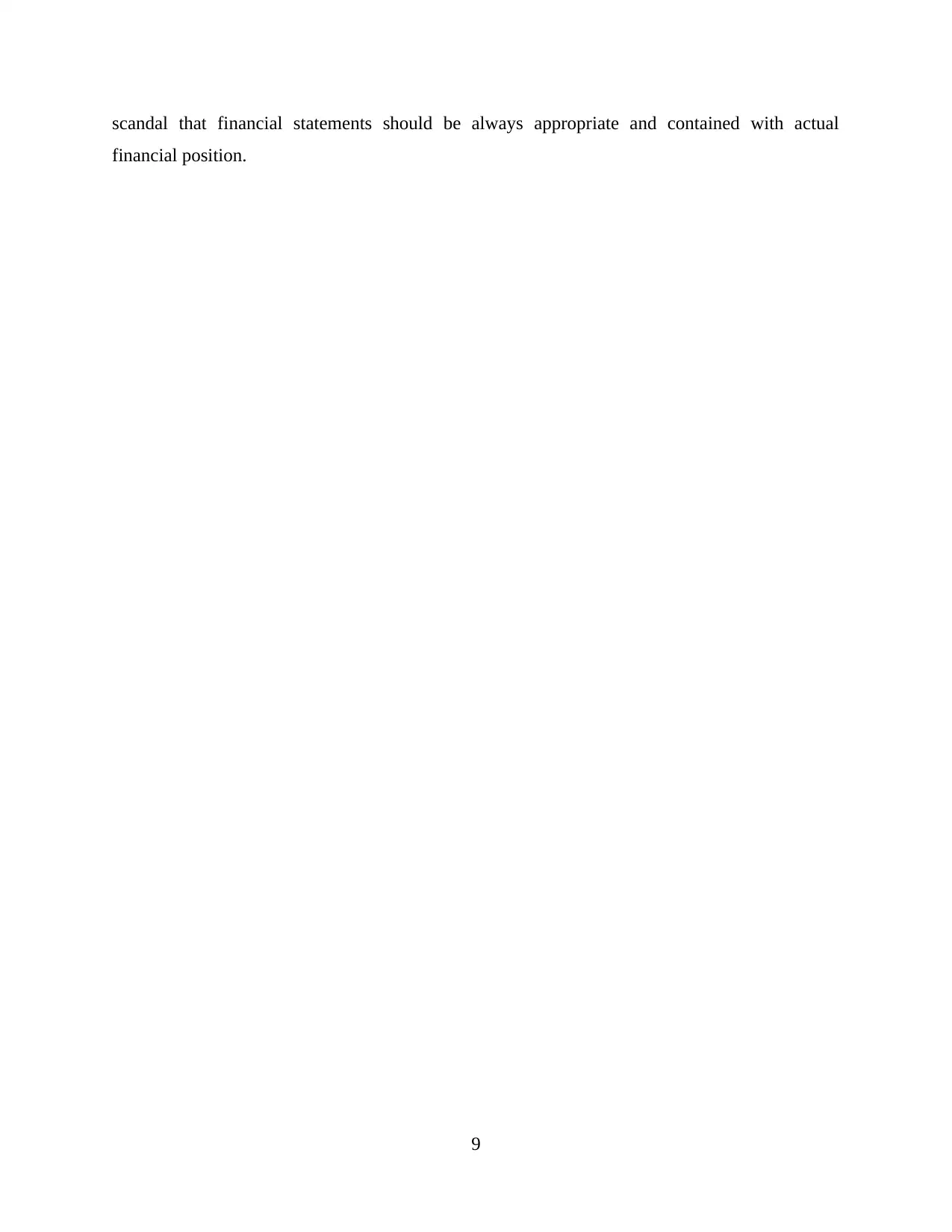
scandal that financial statements should be always appropriate and contained with actual
financial position.
9
financial position.
9
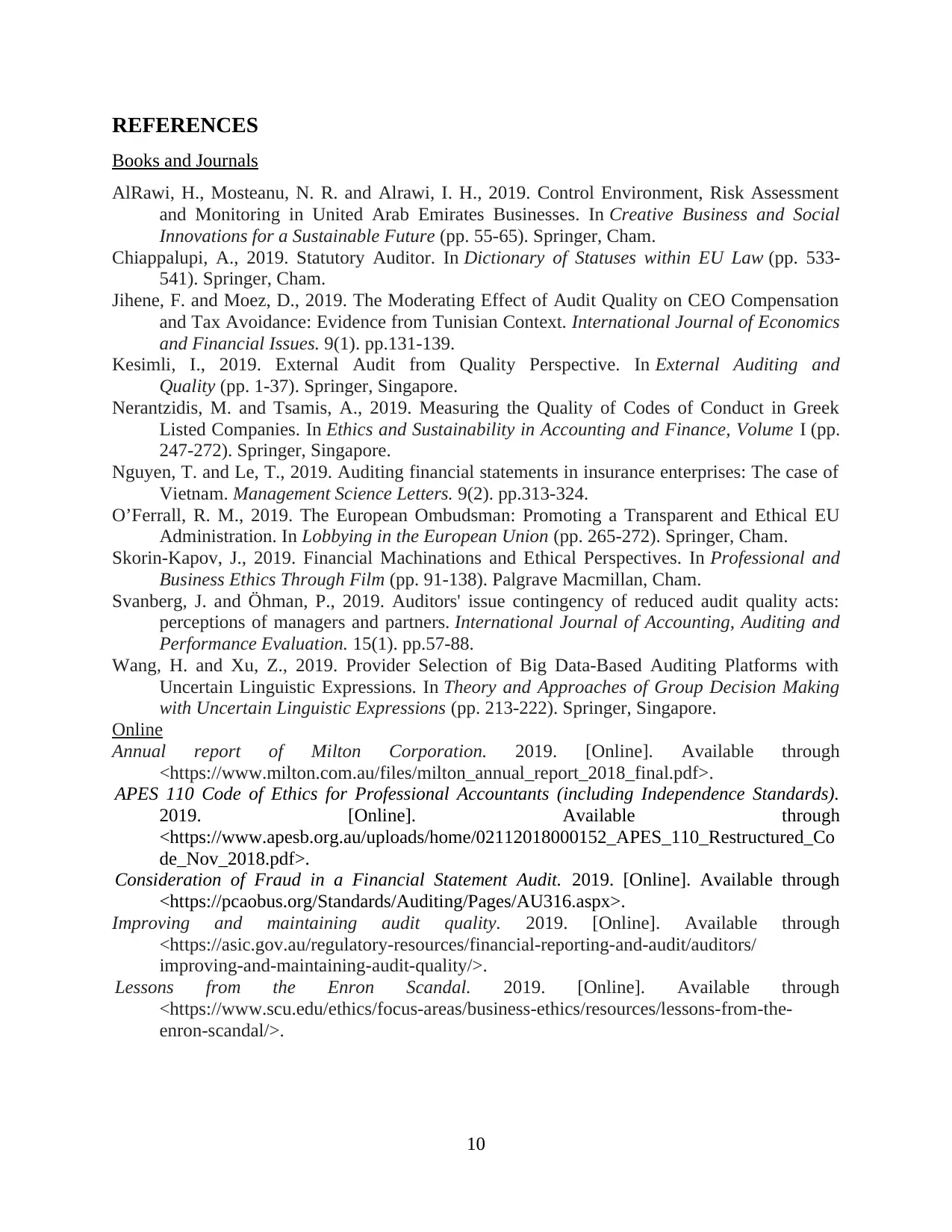
REFERENCES
Books and Journals
AlRawi, H., Mosteanu, N. R. and Alrawi, I. H., 2019. Control Environment, Risk Assessment
and Monitoring in United Arab Emirates Businesses. In Creative Business and Social
Innovations for a Sustainable Future (pp. 55-65). Springer, Cham.
Chiappalupi, A., 2019. Statutory Auditor. In Dictionary of Statuses within EU Law (pp. 533-
541). Springer, Cham.
Jihene, F. and Moez, D., 2019. The Moderating Effect of Audit Quality on CEO Compensation
and Tax Avoidance: Evidence from Tunisian Context. International Journal of Economics
and Financial Issues. 9(1). pp.131-139.
Kesimli, I., 2019. External Audit from Quality Perspective. In External Auditing and
Quality (pp. 1-37). Springer, Singapore.
Nerantzidis, M. and Tsamis, A., 2019. Measuring the Quality of Codes of Conduct in Greek
Listed Companies. In Ethics and Sustainability in Accounting and Finance, Volume I (pp.
247-272). Springer, Singapore.
Nguyen, T. and Le, T., 2019. Auditing financial statements in insurance enterprises: The case of
Vietnam. Management Science Letters. 9(2). pp.313-324.
O’Ferrall, R. M., 2019. The European Ombudsman: Promoting a Transparent and Ethical EU
Administration. In Lobbying in the European Union (pp. 265-272). Springer, Cham.
Skorin-Kapov, J., 2019. Financial Machinations and Ethical Perspectives. In Professional and
Business Ethics Through Film (pp. 91-138). Palgrave Macmillan, Cham.
Svanberg, J. and Öhman, P., 2019. Auditors' issue contingency of reduced audit quality acts:
perceptions of managers and partners. International Journal of Accounting, Auditing and
Performance Evaluation. 15(1). pp.57-88.
Wang, H. and Xu, Z., 2019. Provider Selection of Big Data-Based Auditing Platforms with
Uncertain Linguistic Expressions. In Theory and Approaches of Group Decision Making
with Uncertain Linguistic Expressions (pp. 213-222). Springer, Singapore.
Online
Annual report of Milton Corporation. 2019. [Online]. Available through
<https://www.milton.com.au/files/milton_annual_report_2018_final.pdf>.
APES 110 Code of Ethics for Professional Accountants (including Independence Standards).
2019. [Online]. Available through
<https://www.apesb.org.au/uploads/home/02112018000152_APES_110_Restructured_Co
de_Nov_2018.pdf>.
Consideration of Fraud in a Financial Statement Audit. 2019. [Online]. Available through
<https://pcaobus.org/Standards/Auditing/Pages/AU316.aspx>.
Improving and maintaining audit quality. 2019. [Online]. Available through
<https://asic.gov.au/regulatory-resources/financial-reporting-and-audit/auditors/
improving-and-maintaining-audit-quality/>.
Lessons from the Enron Scandal. 2019. [Online]. Available through
<https://www.scu.edu/ethics/focus-areas/business-ethics/resources/lessons-from-the-
enron-scandal/>.
10
Books and Journals
AlRawi, H., Mosteanu, N. R. and Alrawi, I. H., 2019. Control Environment, Risk Assessment
and Monitoring in United Arab Emirates Businesses. In Creative Business and Social
Innovations for a Sustainable Future (pp. 55-65). Springer, Cham.
Chiappalupi, A., 2019. Statutory Auditor. In Dictionary of Statuses within EU Law (pp. 533-
541). Springer, Cham.
Jihene, F. and Moez, D., 2019. The Moderating Effect of Audit Quality on CEO Compensation
and Tax Avoidance: Evidence from Tunisian Context. International Journal of Economics
and Financial Issues. 9(1). pp.131-139.
Kesimli, I., 2019. External Audit from Quality Perspective. In External Auditing and
Quality (pp. 1-37). Springer, Singapore.
Nerantzidis, M. and Tsamis, A., 2019. Measuring the Quality of Codes of Conduct in Greek
Listed Companies. In Ethics and Sustainability in Accounting and Finance, Volume I (pp.
247-272). Springer, Singapore.
Nguyen, T. and Le, T., 2019. Auditing financial statements in insurance enterprises: The case of
Vietnam. Management Science Letters. 9(2). pp.313-324.
O’Ferrall, R. M., 2019. The European Ombudsman: Promoting a Transparent and Ethical EU
Administration. In Lobbying in the European Union (pp. 265-272). Springer, Cham.
Skorin-Kapov, J., 2019. Financial Machinations and Ethical Perspectives. In Professional and
Business Ethics Through Film (pp. 91-138). Palgrave Macmillan, Cham.
Svanberg, J. and Öhman, P., 2019. Auditors' issue contingency of reduced audit quality acts:
perceptions of managers and partners. International Journal of Accounting, Auditing and
Performance Evaluation. 15(1). pp.57-88.
Wang, H. and Xu, Z., 2019. Provider Selection of Big Data-Based Auditing Platforms with
Uncertain Linguistic Expressions. In Theory and Approaches of Group Decision Making
with Uncertain Linguistic Expressions (pp. 213-222). Springer, Singapore.
Online
Annual report of Milton Corporation. 2019. [Online]. Available through
<https://www.milton.com.au/files/milton_annual_report_2018_final.pdf>.
APES 110 Code of Ethics for Professional Accountants (including Independence Standards).
2019. [Online]. Available through
<https://www.apesb.org.au/uploads/home/02112018000152_APES_110_Restructured_Co
de_Nov_2018.pdf>.
Consideration of Fraud in a Financial Statement Audit. 2019. [Online]. Available through
<https://pcaobus.org/Standards/Auditing/Pages/AU316.aspx>.
Improving and maintaining audit quality. 2019. [Online]. Available through
<https://asic.gov.au/regulatory-resources/financial-reporting-and-audit/auditors/
improving-and-maintaining-audit-quality/>.
Lessons from the Enron Scandal. 2019. [Online]. Available through
<https://www.scu.edu/ethics/focus-areas/business-ethics/resources/lessons-from-the-
enron-scandal/>.
10
1 out of 13
Related Documents
Your All-in-One AI-Powered Toolkit for Academic Success.
+13062052269
info@desklib.com
Available 24*7 on WhatsApp / Email
![[object Object]](/_next/static/media/star-bottom.7253800d.svg)
Unlock your academic potential
© 2024 | Zucol Services PVT LTD | All rights reserved.





